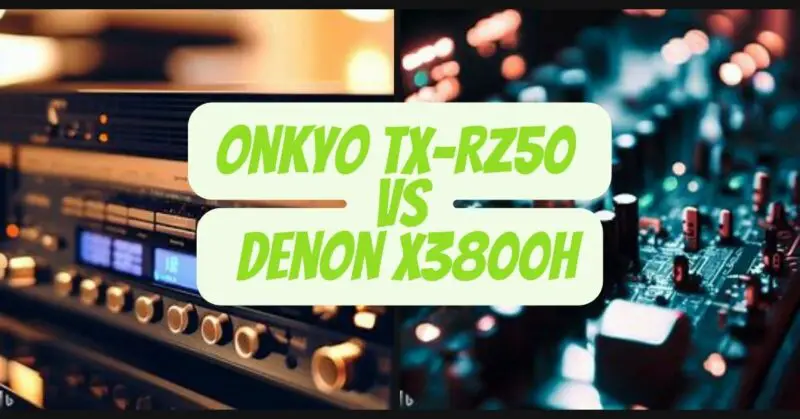When it comes to choosing the perfect AV receiver for your home theater setup, two popular options that often come into consideration are the Onkyo TX-RZ50 and the Denon X3800H. Both receivers are renowned for their audio performance, advanced features, and solid build quality. In this article, we will delve into the details and compare the Onkyo TX-RZ50 and the Denon X3800H to help you make an informed decision.
Design and Build Quality:
Starting with the design and build quality, both the Onkyo TX-RZ50 and the Denon X3800H feature robust constructions that exude a sense of durability. The Onkyo TX-RZ50 boasts a sleek and modern design, with a clean front panel and intuitive controls. On the other hand, the Denon X3800H offers a more traditional aesthetic, with a front panel that includes a large display and a row of buttons. Ultimately, the choice between the two will come down to personal preference.
Audio Performance:
One of the key factors to consider when comparing AV receivers is their audio performance. The Onkyo TX-RZ50 supports Dolby Atmos and DTS:X, providing immersive and three-dimensional soundscapes. With its high current capability, this receiver delivers exceptional clarity and detail across a wide range of frequencies.
Similarly, the Denon X3800H also supports Dolby Atmos and DTS:X, offering an immersive audio experience. It features Denon’s proprietary Advanced AL32 Processing Plus technology, which enhances audio quality by upsampling and expanding low-resolution audio signals. The X3800H also incorporates Denon’s famous amplification technology, providing a dynamic and engaging listening experience.
Connectivity and Features:
In terms of connectivity, both receivers offer a wide array of options. The Onkyo TX-RZ50 features eight HDMI inputs and two HDMI outputs, allowing you to connect multiple devices such as gaming consoles, Blu-ray players, and media streamers simultaneously. It also supports 4K Ultra HD, HDR10, HLG, Dolby Vision, and BT.2020, ensuring compatibility with the latest video formats.
The Denon X3800H also offers eight HDMI inputs and three HDMI outputs, giving you the flexibility to connect various devices. Additionally, it includes eARC (Enhanced Audio Return Channel) support, which enables high-quality audio transmission from the TV to the receiver. The X3800H also supports HDCP 2.3, 4K Ultra HD, HDR10, Dolby Vision, and HLG, ensuring seamless compatibility with modern video standards.
Both receivers come with built-in Wi-Fi and Bluetooth connectivity, allowing you to stream music wirelessly from your favorite devices. They also support popular streaming services such as Spotify, Pandora, and TIDAL, providing a wealth of audio content at your fingertips.
Setup and User Experience:
Setting up and navigating through the features of an AV receiver can be a crucial aspect for many users. The Onkyo TX-RZ50 includes AccuEQ Advance, a calibration system that automatically adjusts the sound output based on your room’s acoustics. It also features an intuitive on-screen setup wizard, simplifying the initial setup process.
The Denon X3800H, on the other hand, incorporates Audyssey MultEQ XT32 room calibration, which fine-tunes the audio settings to match your listening environment. It offers a user-friendly graphical user interface (GUI) that makes it easy to access and configure various settings.
Conclusion:
Both the Onkyo TX-RZ50 and the Denon X3800H are impressive AV receivers with their own set of strengths. The Onkyo TX-RZ50 excels in power output and offers advanced room calibration technology, making it an excellent choice for audiophiles who prioritize precise sound reproduction. On the other hand, the Denon X3800H boasts a slightly superior feature set, including support for Auro-3D and the renowned Audyssey MultEQ XT32 room correction system.
Ultimately, the choice between the Onkyo TX-RZ50 and the Denon X3800H depends on your specific requirements and preferences. It’s recommended to audition both receivers and consider factors such as audio performance, connectivity options, and user experience before making a decision. Whichever receiver you choose, you can rest assured that both Onkyo and Denon offer exceptional quality and performance that will elevate your home theater experience.

